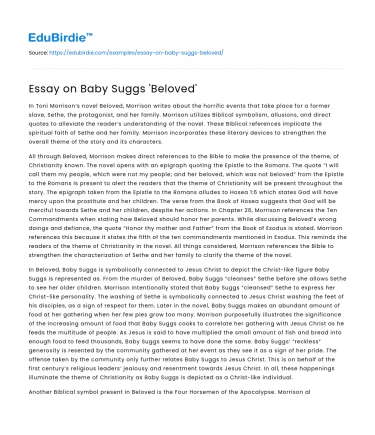In Toni Morrison’s novel Beloved, Morrison writes about the horrific events that take place for a former slave, Sethe, the protagonist, and her family. Morrison utilizes Biblical symbolism, allusions, and direct quotes to alleviate the reader’s understanding of the novel. These Biblical references implicate the spiritual faith of Sethe and her family. Morrison incorporates these literary devices to strengthen the overall theme of the story and its characters.
All through Beloved, Morrison makes direct references to the Bible to make the presence of the theme, of Christianity known. The novel opens with an epigraph quoting the Epistle to the Romans. The quote “I will call them my people, which were not my people; and her beloved, which was not beloved” from the Epistle to the Romans is present to alert the readers that the theme of Christianity will be present throughout the story. The epigraph taken from the Epistle to the Romans alludes to Hosea 1:6 which states God will have mercy upon the prostitute and her children. The verse from the Book of Hosea suggests that God will be merciful towards Sethe and her children, despite her actions. In Chapter 26, Morrison references the Ten Commandments when stating how Beloved should honor her parents. While discussing Beloved’s wrong doings and defiance, the quote “Honor thy mother and Father” from the Book of Exodus is stated. Morrison references this because it states the fifth of the ten commandments mentioned in Exodus. This reminds the readers of the theme of Christianity in the novel. All things considered, Morrison references the Bible to strengthen the characterization of Sethe and her family to clarify the theme of the novel.
Save your time!
We can take care of your essay
- Proper editing and formatting
- Free revision, title page, and bibliography
- Flexible prices and money-back guarantee
In Beloved, Baby Suggs is symbolically connected to Jesus Christ to depict the Christ-like figure Baby Suggs is represented as. From the murder of Beloved, Baby Suggs “cleanses” Sethe before she allows Sethe to see her older children. Morrison intentionally stated that Baby Suggs “cleansed” Sethe to express her Christ-like personality. The washing of Sethe is symbolically connected to Jesus Christ washing the feet of his disciples, as a sign of respect for them. Later in the novel, Baby Suggs makes an abundant amount of food at her gathering when her few pies grow too many. Morrison purposefully illustrates the significance of the increasing amount of food that Baby Suggs cooks to correlate her gathering with Jesus Christ as he feeds the multitude of people. As Jesus is said to have multiplied the small amount of fish and bread into enough food to feed thousands, Baby Suggs seems to have done the same. Baby Suggs’ “reckless” generosity is resented by the community gathered at her event as they see it as a sign of her pride. The offense taken by the community only further relates Baby Suggs to Jesus Christ. This is on behalf of the first century’s religious leaders’ jealousy and resentment towards Jesus Christ. In all, these happenings illuminate the theme of Christianity as Baby Suggs is depicted as a Christ-like individual.
Another Biblical symbol present in Beloved is the Four Horsemen of the Apocalypse. Morrison alludes to the Four Horsemen by comparing the four white men to the Horsemen, to show the horrors that these men brought upon the characters’ lives in this novel. Unclear of which Horsemen represents which, Morrison directly compares School Teacher and his crew to the Four Horsemen of the Apocalypse. At the beginning of this chapter, Morrison alludes to the Four Horsemen of the Apocalypse; Famine, War, Death, and Conquest. Morrison suggests that the cause of Beloved’s death and the events after are the result of the Four Horsemen’s actions. The Horsemen of Death is the root cause of Sethe’s “mercy” towards Beloved by out hurting the hurters. The imagery of death caused by the Apocalypse leads to human choices. The “Apocalypse” leads Sethe into murdering her child, Beloved to prevent her from experiencing a life of torture. After the murder, Baby Suggs is forced to put her work above family when she takes Sethe’s two boys and not Denver. After the event of Beloved’s death, Baby Suggs comes to take Sethe’s children. Morrison purposefully states how Baby Suggs had to take the two boys as they were the only ones old enough to continue working. Baby Suggs had to exchange Denver for the dead child as Sethe was being taken to jail. Ultimately, Morrison makes a direct reference to the Horsemen to explain Sethe’s actions and to provide justification for them.
As expressed, In Toni Morrison’s novel Beloved, Morrison makes Biblical references to illuminate the overall theme of Christianity. These references provide clarification to the characters and their actions and show how each character is related to God in some way, shape, or form.






 Stuck on your essay?
Stuck on your essay?

